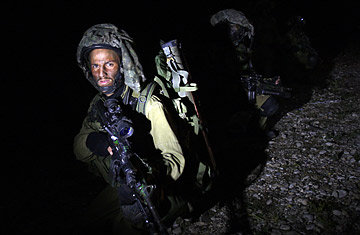
Israeli soldiers advance near the border with northern Gaza during a ground operation by the Israeli army late on Jan. 3, 2009
Israel wants Hamas to take a simple message from the ground invasion of Gaza that began on Saturday: We're coming for you, and we'll stay as long as it takes. The campaign "won't be easy," said Israeli Defense Minister Ehud Barak. "It won't be short. I don't want to delude anyone." He underscored his message by ordering the mobilization of tens of thousands of reserve troops. The purpose of Operation Cast Lead remains a durable cease-fire that ends rocket fire from Gaza into southern Israel, but Israeli officials believe that to reach such an agreement, Hamas must be pummeled onto the ropes, its leaders forced to seek a truce to ensure its survival and continued political control over Gaza.
The ground operation began late Saturday with a massive artillery barrage all along the Gaza boundary, designed not only to destroy whatever fortifications Hamas fighters have built but also to signal that Israel has once again broken its own restraints on military action in Gaza, willing to go hard against the Hamas leadership no matter where they are and no matter the consequences to security along Israel's own southwestern frontier. Already in recent days, Israeli forces struck a house of a Hamas leader while civilians were inside and bombed a mosque at Beit Lahiya believed by Israel to have been used to store weapons. With both these actions, Israel is deliberately cultivating a sense that it has changed the rules of engagement in order to cripple Hamas. (See pictures of the beginning of Israel's ground invasion of Gaza.)
Armored columns began moving slowly and methodically into Gaza Saturday evening, each preceded by an armored bulldozer and supported by helicopters and drones giving Israeli commanders real-time images of the battle space for thousands of yards ahead of the lead bulldozer. Although Hamas had hoped to draw Israeli forces into hand-to-hand combat in the narrow warrens of Gaza's densely populated cities and refugee camps, the Israelis appear instead to be heading for the high ground, looking to seize strategic hilltops that would allow them to better control those parts of Gaza in which Hamas fighters are mingling with the civilian population.
Besides the psychological pressure created by giving Hamas leaders the impression that Israel is launching an invasion on a scale far greater than the militants had anticipated, the Israeli military also knows that the sweeping ground operation will force Hamas fighters and commanders deployed along the frontline to begin withdrawing deeper into the cities and refugee camps. And those militants will be far more vulnerable to attack when forced out of their hiding places and fortifications. Israel not only has the advantage of air cover and the overview of the battlefield it affords but will also use its high-tech abilities to operate by night against Hamas forces on home turf.
Calling up extra reserve troops also sends the message that Israel's operation could be long term — the military forces currently operating on the ground in Gaza are supplied to remain there for between one and three days, after which they'd have to be rotated out — and the fact that many of those reserve troops will be deployed along the northern border with Lebanon is intended to let Hizballah know that Israel has the resources to respond forcefully to any attempt by the Lebanese radical group to attack in solidarity with its allies in Gaza. The reserves also give Israel the capacity to free more combat units from duties elsewhere, like guarding settlements.
Despite the methodical approach and careful planning of the Israeli operation, its commanders do not expect their forces to return unscathed. They're particularly concerned to avoid scenarios that can yield important propaganda victories to Hamas, like the capture of any Israeli soldiers or recorded images of a burning Israeli tank or armored personnel carrier.
As in the case of Hizballah during Israel's 2006 offensive in Lebanon, Hamas has all along believed it will "win" the battle of Gaza simply by remaining intact and on its feet. Although Israel has no intention of taking control of Gaza and getting stuck there, the purpose of its ground invasion is to make Hamas commanders believe that even their goal of surviving and remaining in control of Gaza after Operation Cast Lead is slipping beyond their grasp, in the hope that this will make the organization more likely to accept Israel's truce terms. The armed "negotiation" over Gaza's next cease-fire, then, has entered what will likely be its most intense phase.
